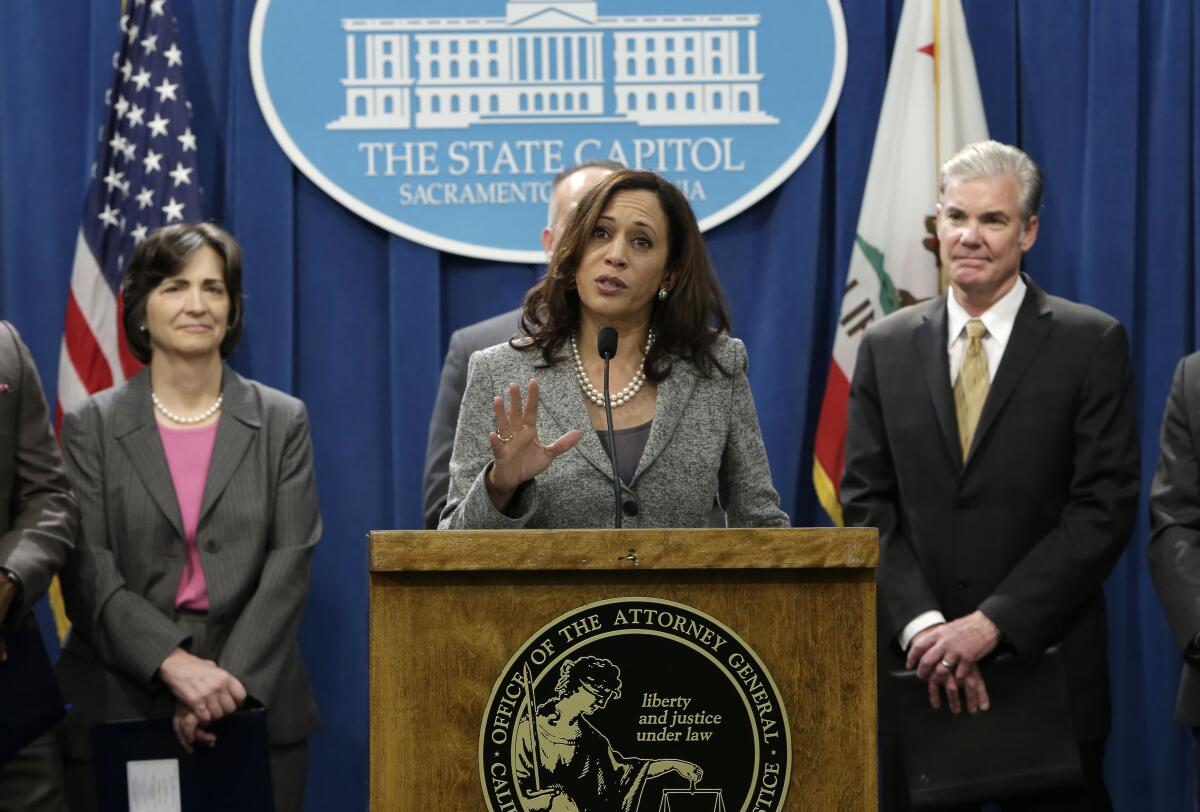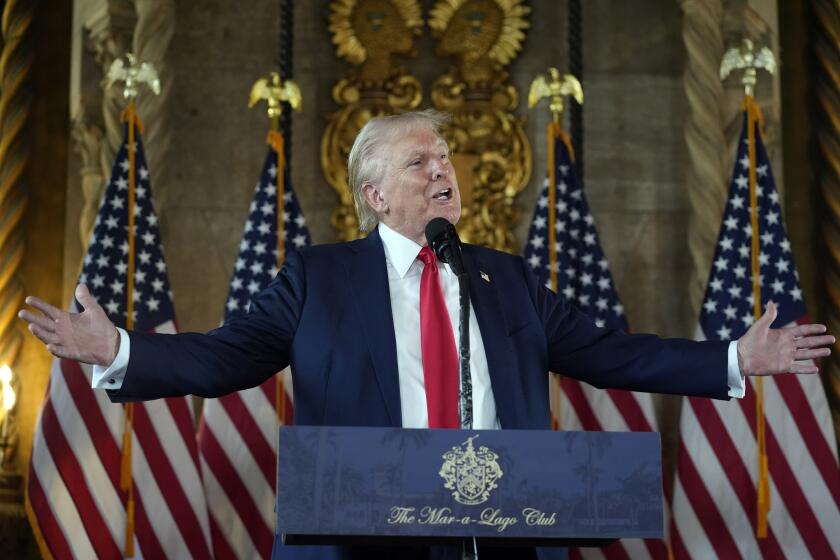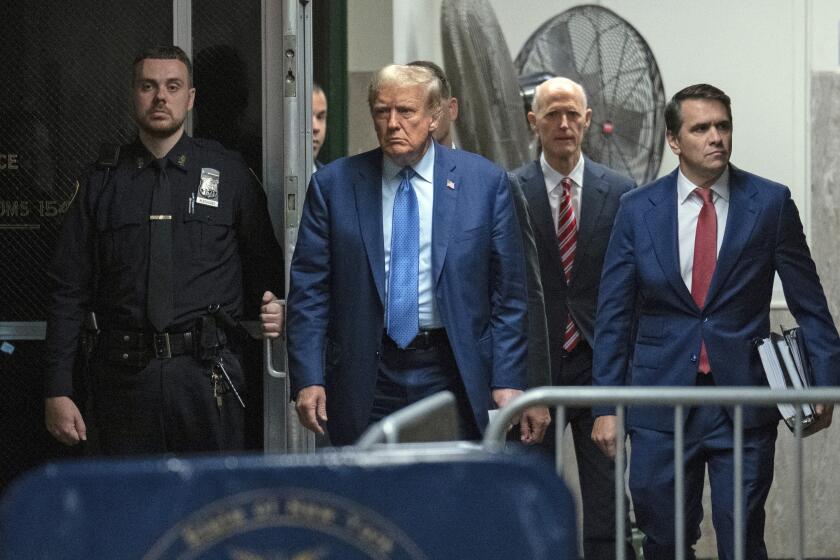What kind of prosecutor was Kamala Harris? The answer could be pivotal to her campaign

- Share via
CHICAGO — The presidential campaign is shaping up to be a tale of two prosecutors, both named Kamala Harris.
Harris’ record as a tough-on-crime prosecutor was a constant refrain through much of this week’s Democratic National Convention.
On Monday, the convention featured an ad parodying the television series “Law & Order” that asserted, “We need a president who has spent her life prosecuting perpetrators like Donald Trump.” Tuesday’s program was even more blunt, including a five-minute video showcasing Harris as a crusading prosecutor who unflinchingly locked up murderers, rapists and child molesters.
Litman: How an Arizona prosecutor’s mistake may have stopped Trump’s fifth criminal indictment
The Arizona grand jurors who charged Giuliani and others in a fake electors plot wanted to include the former president. A prosecutor waved them off.
A series of speakers echoed that theme, touting Harris’ lock-’em-up bona fides. In his headlining speech Tuesday, former President Obama cast Harris, a former San Francisco district attorney and California attorney general, as an uncompromising prosecutor. As with the string of speakers making similar points, Obama focused on red-meat invocations of rapists, child molesters and other sexual predators.
Harris’ experience as a law woman has been the leading theme of her young campaign since she made her debut and rolled out the reliable applause line, “I took on perpetrators of all kinds. … So hear me when I say: I know Donald Trump’s type.”
It all sounds like a vintage campaign for district attorney — and the kind of rhetoric much more frequently deployed by Republicans.
Litman: Will Trump’s conviction survive the Supreme Court’s immunity ruling? It’s complicated
The ex-president’s New York hush money case concerned unofficial, unprotected acts. But the justices’ opinion casts doubt on the permissibility of some evidence.
Yet even as Harris is selling her prosecutorial credentials, the Trump campaign is trotting out a vision of her as feckless and soft on crime — indeed, “one of the worst prosecutors in history,” according to Trump’s characteristically fact-free hyperbole.
This struggle over Harris’ prosecutorial identity is for now the core of the campaign, an unusual feature for a presidential contest. But given Trump’s complete familiarity to supporters and opponents alike, the main variable in the campaign may well be whose vision of Harris prevails.
Trump’s caricature of Harris’ record relies on a series of deceptive and false claims. He has asserted with no basis whatsoever that as district attorney, she “wouldn’t arrest murderers. She wouldn’t arrest anybody.”
Trump also tells his supporters that Harris “supports mandatory gun confiscation” that would leave Americans “defenseless.” That refers to a mandatory assault weapons buyback program that Harris once supported but no longer does.
On immigration law, Trump’s line is that Harris wanted to give “mass amnesty and citizenship” to “all illegals.” The basis for this claim is her past support for a path to citizenship and amnesty for limited groups such as the so-called Dreamers brought into the country illegally as children.
Or Trump accuses Harris of redefining “child sex trafficking, assault with a deadly weapon and rape of a unconscious person … as nonviolent,” a whopper that apparently refers to a 2016 California voter referendum that enabled early release consideration for those convicted of “nonviolent felonies.”
Trump also argues that Harris “supports abolishing cash bail,” which is in fact true. But his conclusion — “which means bloodthirsty criminals that just killed somebody can immediately leave custody, go out and kill somebody else” — is false. Rather, Harris and others support replacing traditional bail with other standards for detaining violent offenders before trial.
You get the idea: Combine the emotional politics of violent crime with Trump’s indifference to truth, and you get a volatile brew of sensationalist accusations that make the George H.W. Bush campaign’s infamous Willie Horton attack look like beanbag. But as the Horton episode demonstrated, deceptive claims about crime can be sticky.
And Harris has a complicated track record on the subject. When she first ran for president, in 2020, she adopted the identity of a “progressive prosecutor,” more or less the opposite of the portrait the convention painted this week. That drew fire from the left based on her past support of initiatives that might strike progressive voters as overly punitive, especially in the wake of that year’s police killing of George Floyd. She also encountered opposition from police groups based on her long-standing opposition to the death penalty.
Four years later, having suddenly acquired the nomination in the wake of President Biden’s disastrous debate, Harris is no longer shying away from the characterizations that undermined her candidacy with the left as she competed in the crowded 2020 primary.
In fact, Harris’ enthusiastic donning of the mantle of tough prosecutor is of a piece with a broader theme of the convention that likely will carry on into the campaign: the Democrats’ self-conscious effort to reclaim an array of traditional American virtues. The first half of the convention was marked by appeals to a throwback, “Ozzie and Harriet” world of Little League games and church socials. Obama put it best in his patent appeal to swing or even Trump voters, saying the majority of the American people “do not want to live in a country that’s bitter and divided.”
Harris is embracing that communitarian vision even as she is presenting herself as a zealous prosecutor of those who would disrupt it. Whether she can maintain that image in the face of Trump’s darker vision may be the central drama of the campaign ahead.
Harry Litman is the host of the “Talking Feds” podcast and the “Talking San Diego” speaker series. @harrylitman
More to Read
A cure for the common opinion
Get thought-provoking perspectives with our weekly newsletter.
You may occasionally receive promotional content from the Los Angeles Times.









